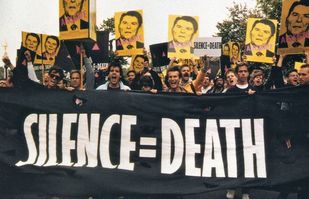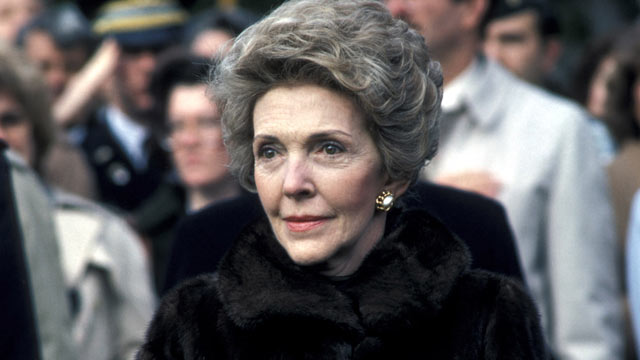"In the LGBT community, the Reagan administration is infamous for its inability to deal with the HIV/AIDS crisis. ... Ronald Reagan famously ignored the problem ... as it ended the lives of tens of thousands of people of all sexual orientations, backgrounds, and identities." -Jimmy Olney

Upon hearing the news of Mrs. Reagan’s death, many who lived through the AIDS crisis of the 1980s found it hard to feel sad or even sympathetic. In the LGBT community, the Reagan administration is infamous for its inability to deal with the HIV/AIDS crisis. Former president Ronald Reagan famously ignored the problem--presumably for its connection to the gay community--as it ended the lives of tens of thousands of people of all sexual orientations, backgrounds, and identities.
AIDS was identified by the Center for Disease Control and Prevention in 1981. This was three years before Gaetan Dugas, the man sometimes identified as the United States’ “patient zero” of AIDS died as a result of the disease. Dugas, a Canadian flight attendant, was originally theorized to have brought AIDS to the Western world, thanks in part to San Francisco journalist Randy Shilts’s book, And the Band Played On. The openly gay Shilts characterized Dugas as a man who intentionally spread the disease out of spite for his own condition. This theory has since been disproven, but Dugas was part of a network of gay men who traveled frequently and most likely spread the disease in some capacity. More recently it was found that HIV/AIDS was introduced to the United States in 1969, further disproving the idea that Dugas “brought” it to the Western world.
What all of this history does prove, however, is that by the time the Reagans finally acknowledged HIV/AIDS in 1985, the crisis was well under way. When Mr. Reagan gave a speech addressing the disease in 1987, six years after the CDC had identified it, approximately 40,000 people had already died of the disease and another 36,000 had been diagnosed.
Mr. Reagan was not just dismissive. He was skeptical and condescending. In 1985 the CDC announced that AIDS could not be transmitted through casual contact. In response to this, Reagan expressed concern that classrooms would not be safe if children with AIDS were allowed to attend. When asked whether he would send his own child to school with a student who has AIDS, Reagan replied, “I’m glad I’m not faced with that problem. . .”
Reagan himself did not say the word “AIDS” until 1985.
In 1990, Ryan White died of AIDS at age 19. White, an Indiana teenager, had received a transfusion of blood that was unknowingly contaminated with HIV/AIDS in the early ‘80s. In 1984 he was diagnosed with HIV and given six months to live. At the time doctors told White that he posed no health risk to the other students at the school, but the parents and school faculty formed an alliance against the boy. As a result, White was expelled. His case, and the legal battle that ensued, gained national attention and White became a kind of sympathetic celebrity.
After White died, Reagan wrote a letter that said, “Ryan, my dear friend, we will see you again.” Then came the Ryan White Act, an enormous piece of HIV-related legislation. To Reagan and many Americans who thought like him, Ryan White was “an innocent victim” for whom they could feel sorry. Young, straight, blameless Ryan White warranted the sympathy they could not find for the thousands of gay men who had died before him.
Five years earlier in July of 1985, actor Rock Hudson had collapsed in a Paris hotel. There was much speculation and discussion as to the source of his worsening health. On October 2nd of that same year, Hudson died of AIDS. He had spent the last months of his life in France seeking treatment that he could not get in the United States.
As Hudson lay dying in his hospital bed, he had his publicist Dale Olson send a telegram to a good friend of his, Nancy Reagan herself.
“Doctor Dominique Dormant, specialist treating Rock Hudson in Paris reports only one hospital in the world can offer necessary medical treatment to save life of Rock Hudson, or at least alleviate his illness…” the telegram pleaded.
Hudson and Olson thought that a request from the White House would be effective in gaining admission to the hospital that could help him. Nancy Reagan denied his request, and the telegram was lost in the shuffle of the Reagan administration.
This is the legacy of Nancy that the LGBT community recalls. The Reagans sought not to associate their administration with the thousands of dying gay men and, through Mrs. Reagan’s “Just Say No” campaign, the drug users who had contracted the disease through intravenous use.
They led a country in which the president of American Airlines could open a breakfast at the Republican National Convention by joking that “gay” stood for, “Got AIDS, yet?” and people would laugh.
This is the history which Hillary Clinton revised when she praised Mrs. Reagan’s “advocacy.” Those who lived through the throes of the AIDS crisis will always remember the years in which they watched their friends drop dead around them.
On March 13th, a short two days after her error, Hillary released an extensive apology.
“To be clear,” she wrote, “the Reagans did not start a national conversation about HIV and AIDS. That distinction belongs to generations of brave lesbian, gay, bisexual, and transgender people, along with straight allies, who started not just a conversation but a movement that continues to this day.”
She invoked the famous slogan regarding HIV/AIDS, “Silence=Death.” She then highlighted the many actions she sees as imperative to the fight against AIDS, including increased access to pre-exposure prophylaxis, or PrEP, an anti-HIV drug that greatly decreases the risk of infection for HIV-negative, sexually active people.
This was a necessary apology.
It is important to recognize why Hillary was wrong. To remember the history that changed and ended so many lives, and to remember how it was handled by those who had the power to do something.
Perhaps Mrs. Reagan’s legacy is best summed up in this analogy, posted on Twitter by writer Dan Fishback:
“Marie Antoinette did some incredible LOW KEY ADVOCACY for the French Underclass.”
After all, let them eat cake is not a far cry from the Reagans’ apparent philosophy: let them have AIDS.


